
Lincoln Theodore Monroe Andrew Perry, better known by the stage name Stepin Fetchit, was an American vaudevillian, comedian, and film actor of Jamaican and Bahamian descent, considered to be the first black actor to have a successful film career. His highest profile was during the 1930s in films and on stage, when his persona of Stepin Fetchit was billed as the "Laziest Man in the World".
Henry Woolf, was a British actor, theatre director, and teacher of acting, drama, and theatre who lived in Canada. He was a longtime friend and collaborator of 2005 Nobel Laureate Harold Pinter, having stimulated Pinter to write his first play, The Room (1957), in 1956. Woolf served as a faculty member at the University of Saskatchewan from 1983 to 1997 and as artistic director of Shakespeare on the Saskatchewan from 1991 until 2001.

Jane Darwell was an American actress of stage, film, and television. With appearances in more than 100 major movies spanning half a century, Darwell is perhaps best remembered for her poignant portrayal of the matriarch and leader of the Joad family in the film adaptation of John Steinbeck's The Grapes of Wrath, for which she received the Academy Award for Best Supporting Actress. She has a star on the Hollywood Walk of Fame.

Thomas Patrick McKenna was an Irish actor, born in Mullagh, County Cavan. He had an extensive stage and screen career.

Accomplice is a 1946 American thriller film directed by Walter Colmes and starring Richard Arlen, Veda Ann Borg, Tom Dugan, and Archie Twitchell. The film, from Producers Releasing Corporation (PRC), was shot in four days. The film is written by Frank Gruber, based on his novel Simon Lash, Private Detective.
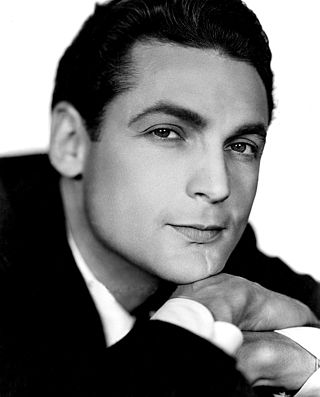
Charles David Farrell was an American film actor whose height was in the 1920s and 1930s and the Mayor of Palm Springs from 1947 to 1955. Farrell was known for his onscreen romances with actress Janet Gaynor in more than a dozen films, including 7th Heaven, Street Angel, and Lucky Star. Later in life, he starred on TV in the 1950s sitcoms My Little Margie and played himself in The Charles Farrell Show. He was also among the early developers of Palm Springs.

Brewster's Millions is a 1985 American comedy film directed by Walter Hill. The film stars Richard Pryor, John Candy, Lonette McKee, Stephen Collins, and Hume Cronyn. The screenplay by Herschel Weingrod and Timothy Harris was based on the 1902 novel of the same name by George Barr McCutcheon. It is the seventh film based on the story.

Dollar Bank is a full-service regional savings bank serving both individuals and business customers, operating more than 90 offices throughout Pennsylvania, Ohio, Maryland, and Virginia. The bank's Pennsylvania headquarters is located in downtown Pittsburgh, Ohio headquarters is located in downtown Cleveland, and Virginia headquarters is located in Hampton Roads.

We're Not Married! is a 1952 American anthology romantic comedy film directed by Edmund Goulding. It was released by 20th Century Fox.

The Freedman's Saving and Trust Company, known as the Freedman's Savings Bank, was a private savings bank chartered by the U.S. Congress on March 3, 1865, to collect deposits from the newly emancipated communities. The bank opened 37 branches across 17 states and Washington DC within 7 years and collected funds from over 67,000 depositors. At the height of its success, the Freedman's Savings Bank held assets worth more than $3.7 million in 1872 dollars, which translates to approximately $80 million in 2021.

King Corn is a documentary film released in October 2007 that follows college friends Ian Cheney and Curtis Ellis as they move from Boston to Greene, Iowa to grow and farm an acre of corn. Coincidentally, the trip also takes them back to where both of their families have roots. In the process, Cheney and Ellis examine the trend of increased corn production and its effects on American society, highlighting the role of government subsidies in encouraging the huge amount of corn grown. Furthermore, by studying the food economy through the history of corn in America, the two realize most foods contain corn in some form.
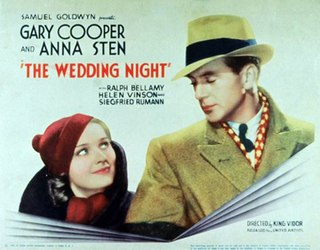
The Wedding Night is a 1935 American romantic drama film directed by King Vidor and starring Gary Cooper and Anna Sten. Written by Edith Fitzgerald and based on a story by Edwin H. Knopf, the film is about a financially strapped novelist who returns to his country home in Connecticut looking for inspiration for his next novel and becomes involved with a beautiful young Polish woman and her family. The film was produced by Samuel Goldwyn and filmed at Samuel Goldwyn Studios from early November to early December 1934. It was released in the United States on March 8, 1935.

Manhattan Tower is a 1932 American pre-Code film directed by Frank R. Strayer starring Mary Brian and James Hall.
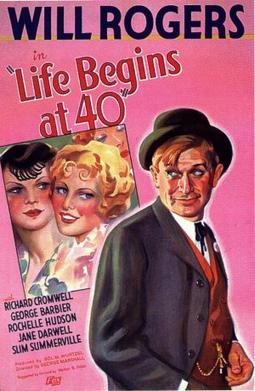
Life Begins at 40 is a 1935 black-and-white film starring Will Rogers and Richard Cromwell. It is based on the non-fiction self-help book Life Begins at Forty by Walter B. Pitkin.

A Yank in Libya is a 1942 American war thriller film directed by Albert Herman and starring H. B. Warner, Walter Woolf King, Parkyarkarkus and Joan Woodbury.

The Three Musketeers is a 1935 film directed by Rowland V. Lee and starring Walter Abel, Heather Angel, Ian Keith, Margot Grahame, and Paul Lukas. It is the first English-language talking picture version of Alexandre Dumas's 1844 novel The Three Musketeers.
"The Fool Monty" is the sixth episode of the twenty-second season of the American animated television series The Simpsons. It originally aired on the Fox network in the United States on November 21, 2010. In the episode, Bart finds Mr. Burns lying in the forest and takes him home, while Homer decides to get revenge. It was directed by Steven Dean Moore and written by Michael Price.
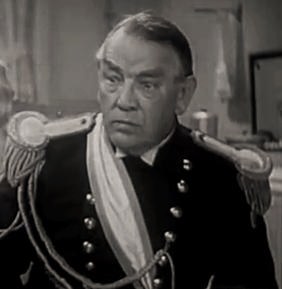
Frederick Roger Imhof was an American film actor, vaudeville, burlesque and circus performer, sketch writer, and songwriter.

Accent on Youth is a 1935 American comedy film directed by Wesley Ruggles and written by Herbert Fields and Claude Binyon based on the 1934 play of the same name written by Samson Raphaelson. The film stars Sylvia Sidney and Herbert Marshall and features Phillip Reed, Holmes Herbert, Catherine Doucet, Astrid Allwyn and Lon Chaney Jr. The film was released on August 23, 1935, by Paramount Pictures.
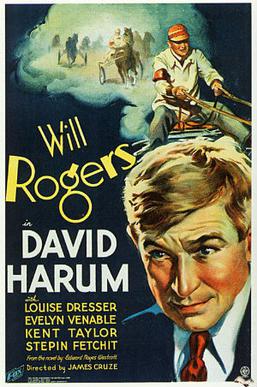
David Harum is a 1934 American comedy film directed by James Cruze and written by Walter Woods. The film stars Will Rogers, Louise Dresser, Evelyn Venable, Kent Taylor, Stepin Fetchit, Noah Beery, Sr. and Roger Imhof. The film was released on March 3, 1934, by Fox Film Corporation.


















